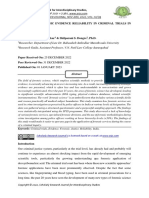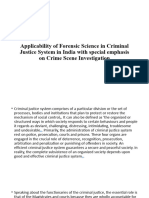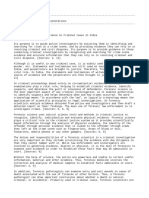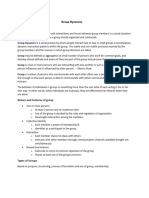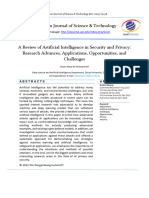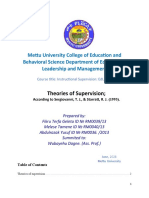Module-01 Introduction To Forensic Science
Uploaded by
info.pssy.cssrModule-01 Introduction To Forensic Science
Uploaded by
info.pssy.cssrMr.
Jash Trivedi O/o Managing Director
Director-JKTA RCASR LLP JKTA Research Center for Advanced
Police Researcher (Freelance) Security Reforms LLP
Forensic Investigator Managingdirector.jkta@gmail.com
(Freelance)
Module 01: Introduction to Forensic Science
Forensic Science is the application of scientific principles and techniques to matters of
criminal justice and law. It plays a vital role in investigating crimes, examining evidence, and
presenting scientific findings in courts of law. Forensic science combines knowledge from
multiple disciplines such as biology, chemistry, physics, medicine, and digital sciences to
assist law enforcement agencies in solving crimes and ensuring justice.
Historical Background
The origins of forensic science can be traced back to ancient civilizations. In ancient China,
fingerprints were used as a form of identification. In India, evidence-based justice systems
existed in the Mauryan and Gupta periods. Modern forensic science, however, developed
during the 19th and 20th centuries with the introduction of fingerprint classification systems,
ballistics, and toxicology. Today, forensic science has evolved with advanced technologies
such as DNA profiling, digital forensics, and artificial intelligence-driven crime analysis.
Branches of Forensic Science
Forensic science is a multidisciplinary field, with several specialized branches:
1. Forensic Biology – Involves DNA analysis, bloodstain pattern analysis, and
biological evidence examination.
2. Forensic Chemistry – Deals with toxicology, drug analysis, and chemical trace
examination.
3. Forensic Physics – Examines ballistics, tool marks, glass fracture patterns, etc.
4. Digital Forensics – Involves recovery and analysis of digital data from mobile
phones, computers, and networks.
5. Forensic Medicine – Includes post-mortem examinations, injury analysis, and cause
of death determination.
6. Forensic Psychology – Assists in criminal profiling, behavior assessment, and
courtroom testimonies.
7. Questioned Documents & Fingerprints – Involves handwriting verification,
signature authentication, and fingerprint identification.
Mr. Jash Trivedi O/o Managing Director
Director-JKTA RCASR LLP JKTA Research Center for Advanced
Police Researcher (Freelance) Security Reforms LLP
Forensic Investigator Managingdirector.jkta@gmail.com
(Freelance)
Importance of Forensic Science in Criminal Justice
Forensic science provides objective and scientific evidence that helps establish the facts of a
case. It reduces reliance on oral testimony and subjective interpretation. DNA profiling,
fingerprint matching, and ballistic examinations are crucial tools in identifying suspects,
exonerating the innocent, and strengthening prosecution cases. Without forensic science,
many crimes would remain unsolved or wrongly judged.
Scenarios of Forensic Science in India:
In recent years, forensic science has played a critical role in solving complex cases
worldwide. For example, the 2025 Ahmedabad Plan Crash involved forensic experts
analyzing digital communications, Aeronautical Chemical Examination, and Charred
evidence to track the Incident origins. In Gujarat, Forensic DNA analysis has been
increasingly used in plan crash to identify the deceased corpus to handover their bodies to
their family members. This can be ruled out that Forensic Science can be important and
significant for Disaster Victim Identification.
Applications of Forensic Science in Modern Times
1. Crime Scene Investigation: Collection and preservation of physical evidence.
2. Courtroom Evidence: Presentation of expert testimony based on scientific findings.
3. Disaster Victim Identification: Forensic odontology and DNA analysis help in identifying
victims.
4. Cybercrime Investigations: Digital forensics helps track online fraud, hacking, and
cyberterrorism.
5. Wildlife Forensics: Tracking poaching and illegal animal trade using DNA barcoding.
6. Counterterrorism: Forensic analysis of explosives and weapons in terrorist incidents.
Challenges in Forensic Science
Despite its importance, forensic science faces several challenges. These include lack of
infrastructure in many regions, backlog of forensic cases, shortage of skilled experts, and
concerns about accuracy and misuse of forensic evidence. In India, the National Forensic
Infrastructure has been expanding, yet demand outpaces supply. Ensuring standardization,
training, and international cooperation are essential for the field’s growth.
Mr. Jash Trivedi O/o Managing Director
Director-JKTA RCASR LLP JKTA Research Center for Advanced
Police Researcher (Freelance) Security Reforms LLP
Forensic Investigator Managingdirector.jkta@gmail.com
(Freelance)
Future of Forensic Science
Forensic science is moving towards integrating Artificial Intelligence, Machine Learning, and
advanced automation in evidence analysis. Technologies such as 3D crime scene
reconstruction, virtual autopsy, and blockchain for evidence security are becoming
prominent. The future of forensic science will see more accurate, rapid, and reliable methods
of evidence examination, ensuring justice in an increasingly complex society.
Conclusion
Forensic Science is an ever-evolving discipline that continues to shape the landscape of
criminal investigations and justice delivery. Its role in modern society is indispensable,
bridging the gap between science and law. With advancements in technology, forensic
science will become even more crucial in tackling emerging crimes, from cyber threats to
bioterrorism. Thus, understanding its basics, scope, and applications is vital for students, law
enforcement officers, and legal practitioners alike. Also India need Forensic Scientist and
Young Forensic Enthusiast who can invent India based for Forensic Science and Duo of
Young Enthusiast and Experienced Mentor can be most Ideal Collaboration and Most
Required Collaboration.
About Author;
Jash Trivedi is a dynamic professional with a strong academic and practical background in
Forensic Science, Police Administration, and Strategic Management, specializing in Crime
Scene Investigation, Counter-Terrorism, Field Intelligence, and Surveillance. With a B.Sc. in
Forensic Science & M.A. in Police Administration and Strategic Management he combines
academic excellence with hands-on expertise. Since 2020, he has worked as a Freelance
Field Investigator and Surveillance Officer (Forensic Science) with PAN India based
Clients, handling complex investigation and corporate intelligence assignments. In 2024, he
advanced to the role of Independent Director (Security, Vigilance & Intelligence
Division) at the JKTA Research Center for Advanced Security Reforms LLP, where he
contributes to policy formulation, security reforms, and training modules aimed at
strengthening India’s internal security and modern policing frameworks.




























